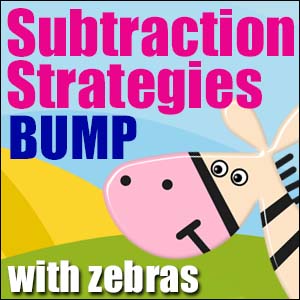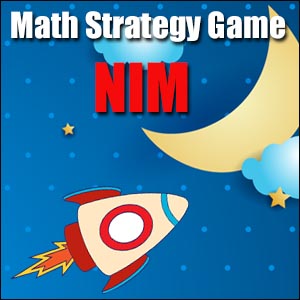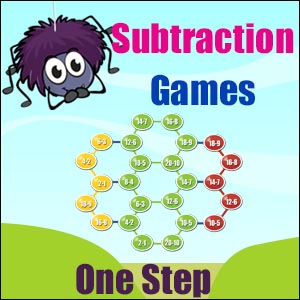Multiplication Games
2 Times Table to 12 Times Table – Picaria
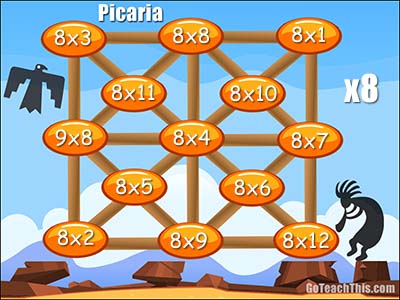
Multiplication Games – Printable
Multiplication Game:
Picaria is a fast-paced Native American game traditionally played by Nations of the South West of the USA. This version includes Multiplication facts to add an extra dimension to the game.
What You Need:
2 players
1 game board
3 counters of different colors for each player
2 calculators (optional)
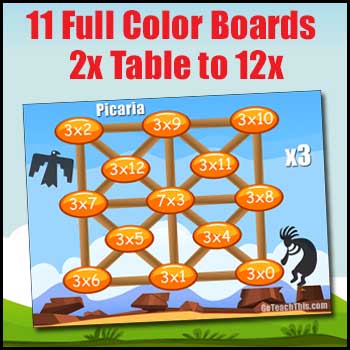
Multiplication Games – Picara
How to Play:
1. Person with the smallest shoe size becomes Player 1.
2. Player 1 places chooses an ellipse, reads the algorithm, answers it aloud then places a counter over it.
NB Player 1 CANNOT take the center of the board.
3. Alternate placing counters on the board and answering algorithms until all six counters are in play.
4. Take turns sliding individual pieces along the lines to the nearest vacant ellipse and answering the algorithms.
NB NO JUMPING or CAPTURES are allowed.
How to Win:
Get 3 counters in a row either vertically, horizontally or diagonally.
Before the Game:
– Picaria is a fast-paced, brief game. This is part of the fun. Be sure to point this out and have the students aspire to play in this fashion.
– Discuss – ‘What thought processes and behaviors and thought processes would we see an effective learner exhibiting during this game?’
– List 3 ways you can help your partner during this game?
– Excellent learners welcome obstacles and find ways to overcome them. What does this mean for you?
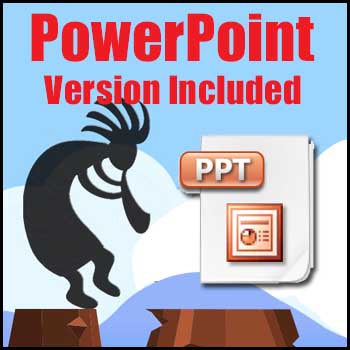
Multiplication – Number Talks
– Number focus discussions – as a whole class focus, discuss strategies used for arriving at the correct answer. NB the correct answer is only part of the equation here.
– What thought processes/number manipulations are done to arrive at the correct answer? Include plenty of debate and discussion around ‘What do you think is the most efficient method for you?’
During the Game:
– Have discussions with students about the strategies they are using to arrive at correct answers.
Possible After the Game Reflections:
– How has this game helped you grow in your number knowledge?
– How could you change this game to be more effective for you?
– Discuss – We all have the ability to learn in Math. We need to focus on how numbers work not rote learn heaps and heaps of facts.
– Discuss – There are ‘Mathematics people’ and ‘Non-Mathematics’ people. What are your thoughts on this generalization?
(Teaching note – the notion of being a ‘Math person’ is detrimental to teaching & learning on so many levels. People need to see they have the ability to grow in understanding and not believe their ability is somehow fixed – see the work of Jo Boaler – esp her book – ‘The Elephant in the Classroom’)
– The calculator is an aid. It is a tool to help you get to the right answer. For traditional multiplication facts, the human mind is much faster. Devise a way to test this notion using the teacher as the brain and the students on the calculators. NB Some people make a game of it called ‘Beat the Teacher’ (The double meaning of the word ‘beat’ is not lost on the students) hehehe
Strategy Exploration:
If you place your counters in the corner points at the beginning of the game they are limited to moving in 3 directions. There are spots on the board where your counter can move in 4 directions and even 8. Try placing your counters to enable maximum movement. How did this work for you?
Possible Extension:
– Picaria is a Native American variation of the European game Achi. How did the game get to America and why are people playing it?
– There are several Native American symbols used on the game board. Research what they are and their meanings. Hint A Thunderbird and Kokopelli.
– Find another Native American game and convert it into a Math game.
Enjoy!
EXPLORE MORE


